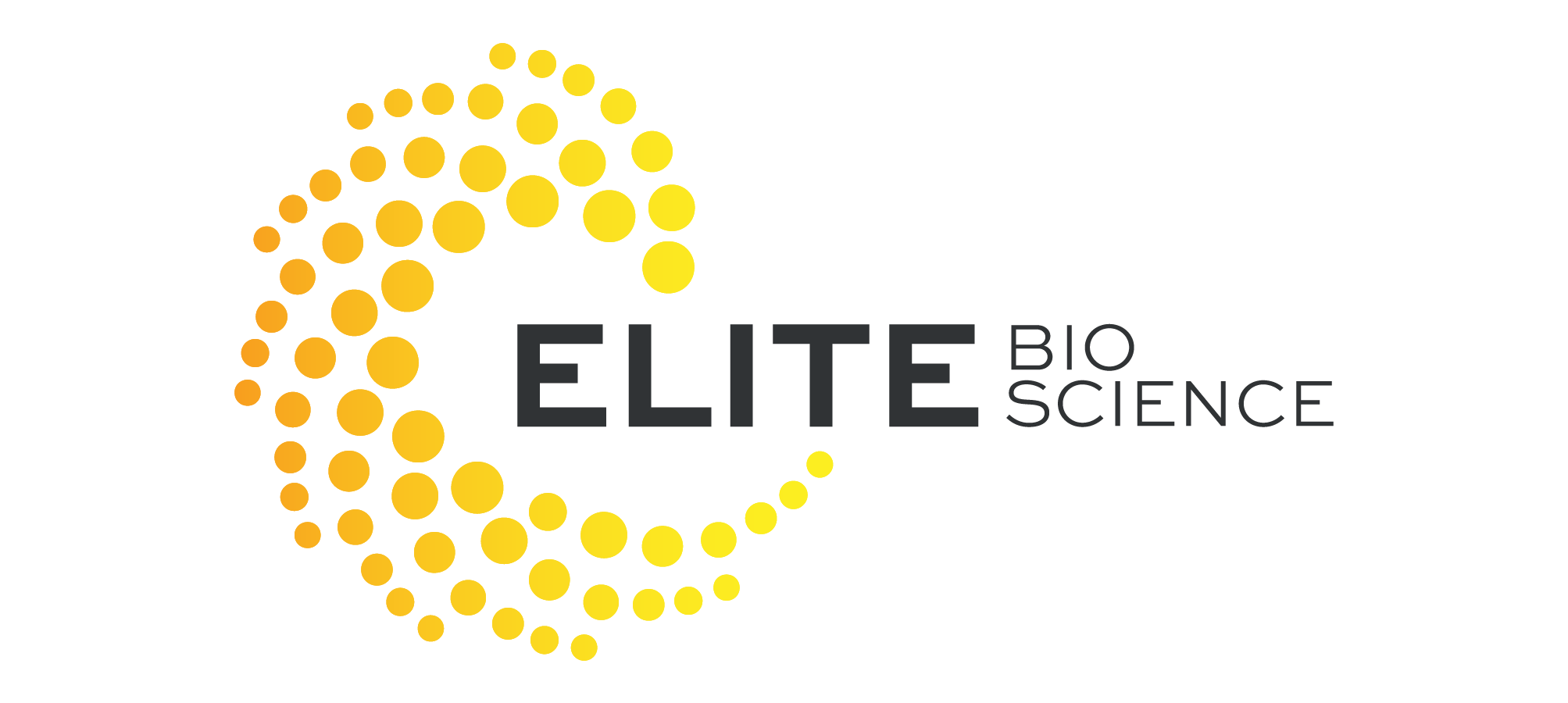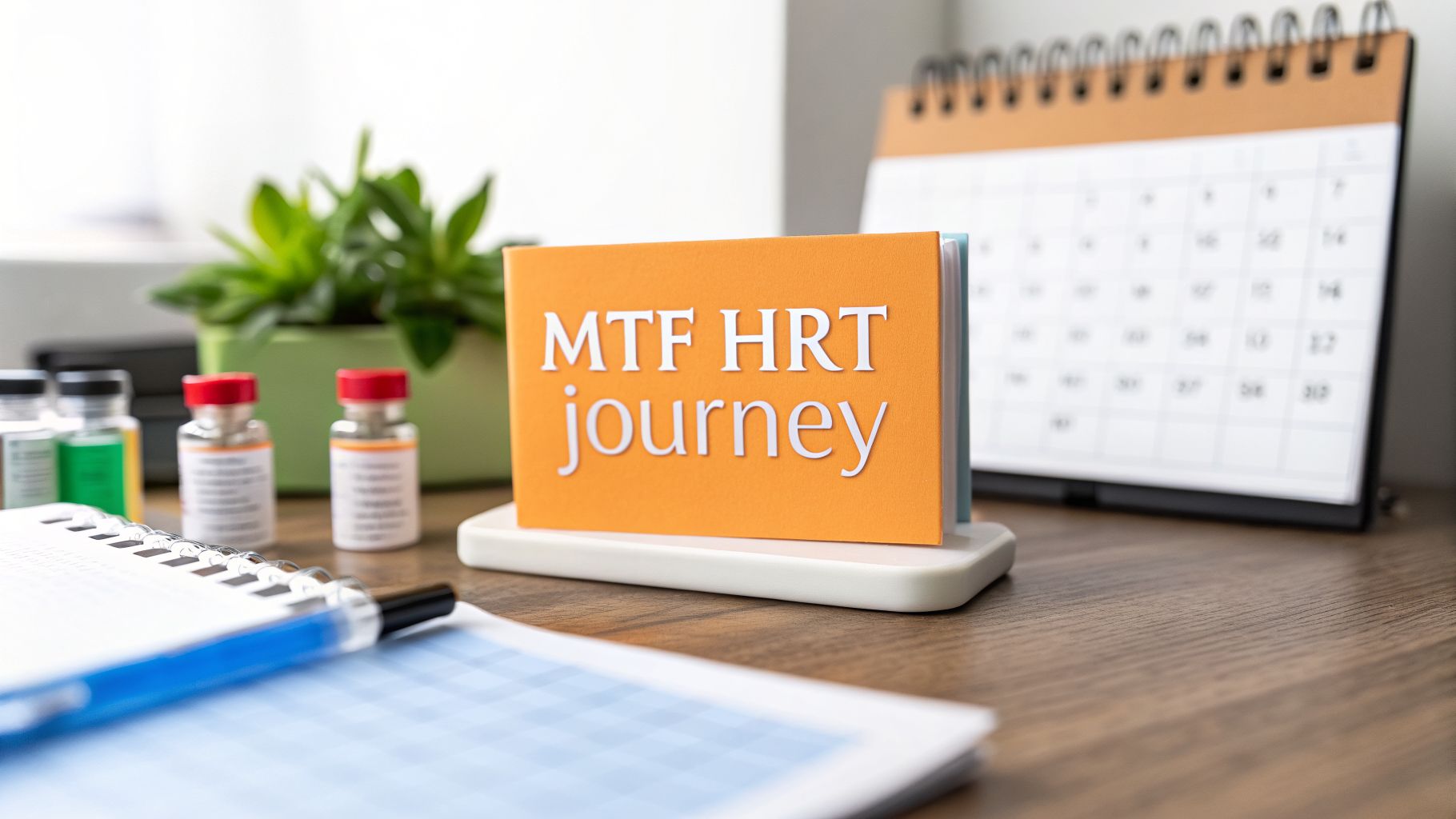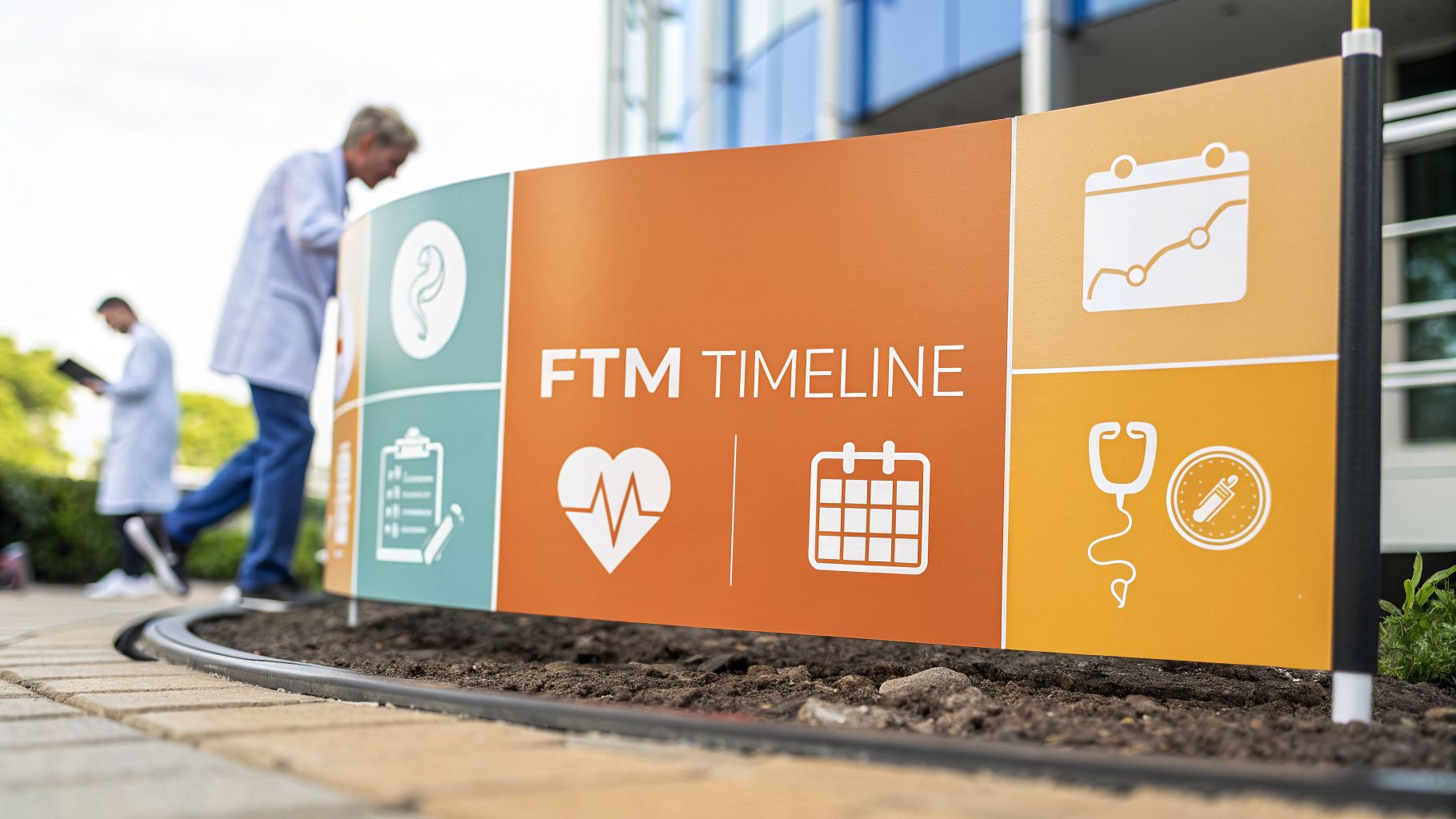B12 Injections vs Oral Which Is Better?
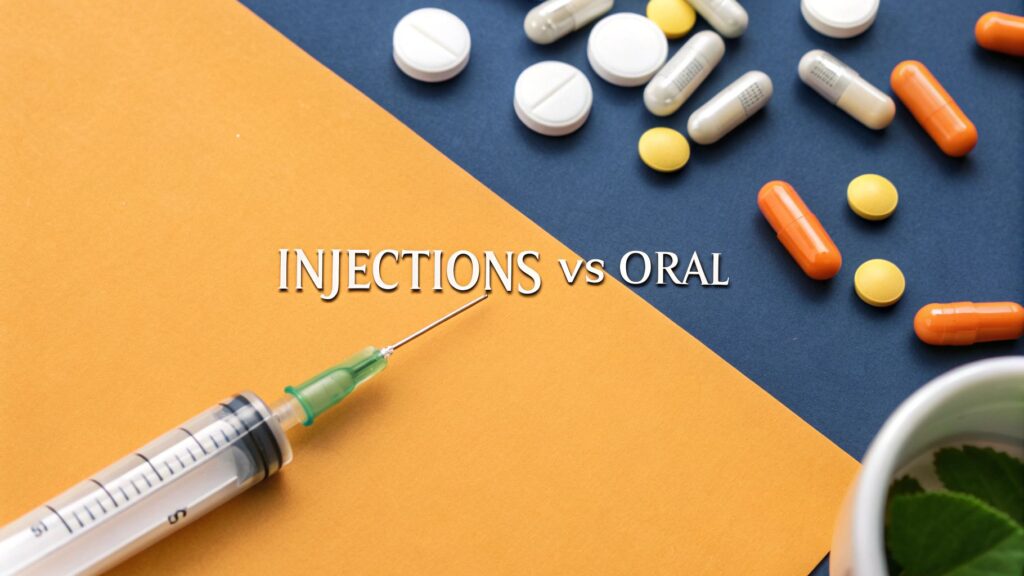
When you're trying to figure out whether to go with B12 injections vs oral supplements, here’s the bottom line from my experience: for most people with a mild deficiency, high-dose oral tablets are just as effective as injections. The right choice really boils down to the root cause of your deficiency, your body's unique ability to absorb nutrients, and what's most convenient for you long-term.
Navigating Your B12 Treatment Options
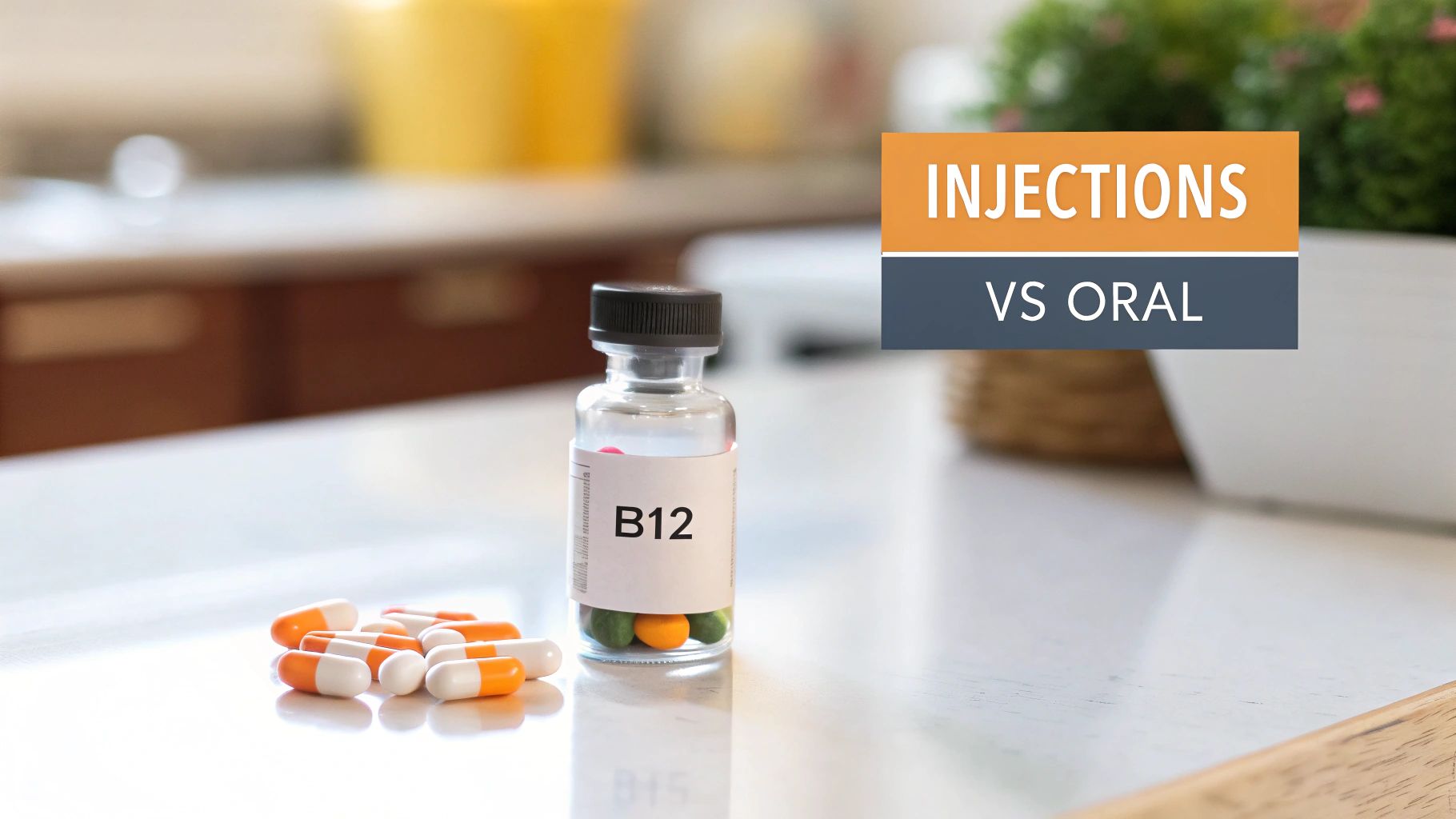
Picking the right form of vitamin B12 is a huge step toward fixing a deficiency and getting back your energy and mental clarity. For years, injections were the gold standard, especially for severe cases. But modern research has shown that oral options, particularly the high-dose and sublingual (under-the-tongue) forms, are serious contenders.
This isn't a simple case of one being universally "better" than the other. It’s all about matching the delivery method to your body’s specific needs.
A few key factors will heavily influence this decision:
- Digestive Health: If you have a condition like Crohn's disease, celiac disease, or have had gastric surgery, your gut's ability to absorb B12 might be severely compromised.
- Pernicious Anemia: This autoimmune condition stops your body from making intrinsic factor, a protein that's absolutely essential for B12 absorption. Standard oral doses just won't work.
- Severity of Symptoms: For anyone dealing with significant neurological symptoms like numbness, tingling, or memory loss, the fast, guaranteed absorption from an injection is often necessary.
- Lifestyle and Preference: Let's be practical. Cost, convenience, and how you feel about needles all play a big part in sticking with a treatment plan over time.
Getting a handle on these variables is the first step to having a productive conversation with your doctor. This guide will walk you through the evidence behind B12 injections and oral supplements so you can find the most effective path forward.
Quick Comparison B12 Injections vs Oral Supplements
To get a quick sense of the main differences, this table lays out the core features of each method at a glance. It’s a great starting point for understanding where each option shines.
| Feature | B12 Injections | Oral B12 Supplements |
|---|---|---|
| Absorption Method | Bypasses the digestive system for direct entry into the blood. | Relies on the digestive tract for absorption. |
| Bioavailability | Guaranteed 100% absorption of the dose. | Varies a lot based on gut health and the specific dosage. |
| Best For | Severe deficiencies, malabsorption issues, rapid symptom relief. | Mild deficiencies, daily maintenance, dietary top-ups. |
| Convenience | Needs a clinic visit or a prescription for self-administration. | Easy to find over-the-counter and take at home daily. |
As you can see, injections offer certainty and speed, making them indispensable for specific medical conditions. On the other hand, oral supplements provide a convenient and effective solution for the majority of people looking to maintain healthy B12 levels.
Understanding How Your Body Uses Vitamin B12
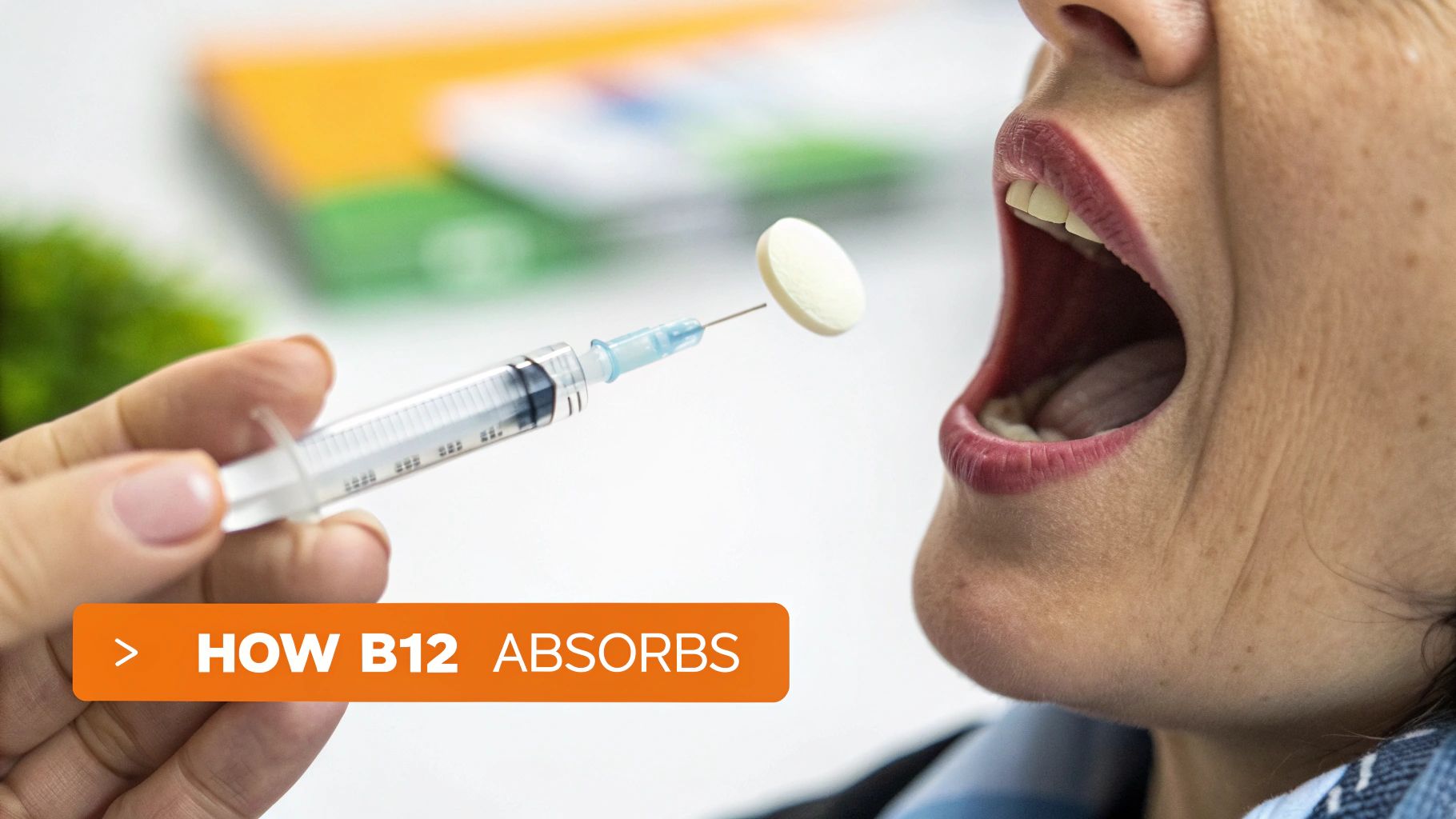
To really get to the heart of the "B12 injections vs. oral" debate, we have to look at how your body actually handles this crucial nutrient. It's not as simple as swallowing a pill and getting the full dose. When you take B12 orally, it goes on a complex journey through your digestive system, using two completely different pathways to get into your bloodstream.
The main route relies on a special protein your stomach makes called intrinsic factor. Think of intrinsic factor as a personal bodyguard for vitamin B12. It latches onto the vitamin, protecting it from the harsh, acidic environment of your gut until it can be safely absorbed later on in the small intestine.
But this primary pathway has a major limitation—it’s like a single-lane road during rush hour. Your body can only produce so much intrinsic factor at once, which caps B12 absorption at a tiny 2-3 micrograms (mcg) per meal. This bottleneck is exactly why standard, low-dose oral supplements often fail to make a dent in a serious deficiency.
The Power of High-Dose Oral B12
This is where the second absorption pathway, known as passive diffusion, becomes a game-changer. This alternate route doesn't need intrinsic factor at all. Instead, when you take a very large dose of B12—usually 1000 mcg or more—a small portion of it can muscle its way directly through the intestinal walls and into your bloodstream.
Key Insight: Even if your main absorption pathway is broken due to issues like pernicious anemia or gastric surgery, high-dose oral B12 uses passive diffusion to completely sidestep the problem. This makes it a surprisingly effective treatment for many people.
This clever biological workaround is why high-dose oral supplements can be so effective. Sure, only a tiny percentage gets absorbed this way, but when the starting dose is massive, that small fraction adds up to a medically significant amount of B12.
How Injections Change the Game
So, how do injections fit into all this? Simple: they bypass the entire digestive system. By delivering the vitamin straight into the muscle, the full dose goes directly into the bloodstream, guaranteeing 100% bioavailability. No gut, no intrinsic factor, no problem.
This direct-to-bloodstream route makes injections the clear winner for people with:
- Severe malabsorption disorders that block any meaningful B12 absorption from the gut.
- Critical neurological symptoms that demand the fastest possible fix. Knowing what to look for is vital, and you can learn about the wide range of vitamin B12 deficiency symptoms in our detailed guide.
- Adherence issues, where getting a weekly or monthly shot is far more manageable than remembering a daily pill.
The science behind passive diffusion is solid. Clinical studies have shown that about 1% of an oral dose of crystalline B12 is absorbed passively, completely independent of intrinsic factor. So, a 1000 mcg oral pill can deliver around 10 mcg of B12 into your system—an amount often sufficient to correct a deficiency with consistent use.
Ultimately, understanding these absorption mechanics shows why both injections and high-dose oral supplements have their place. The best choice isn't about which one is "better" in general, but which one is right for your specific physiology and the root cause of your deficiency.
Injections vs. Pills: Which One Actually Works Better?
When it comes to B12 injections versus oral supplements, the ultimate question is simple: which one really works? For decades, doctors leaned heavily on injections, working under the assumption that they were the only surefire way to fix a deficiency. But as clinical evidence has evolved, the story has become much more nuanced, challenging that long-held belief.
The logic behind favoring injections is solid—they offer 100% bioavailability. Since the B12 is delivered directly into your bloodstream, it completely bypasses the digestive system. This makes injections absolutely essential for anyone with severe absorption problems or for those who need to reverse serious symptoms, and fast.
But is that direct route always necessary? According to a ton of modern research, the answer is often no. It turns out that high-dose oral supplements are a powerful and effective alternative for most people.
Challenging Old Assumptions with New Data
The secret to making oral B12 work lies in the dosage. Your standard, low-dose B12 pill from the grocery store probably won't be enough to correct a true deficiency. However, high-potency formulas packing 1000-2000 mcg are a different beast entirely. They're strong enough to restore healthy B12 levels, even in patients with absorption issues like pernicious anemia.
This isn't just a theory; it's backed by hard clinical data. Systematic reviews comparing both methods have found that, over a few months, high-dose oral therapy can raise B12 levels in the blood just as effectively as intramuscular injections. This discovery has completely shifted the conversation, making oral supplements a valid first-line treatment for many.
A landmark systematic review showed that daily oral B12 doses of 1000 to 2000 mcg brought serum concentrations to levels similar to—and sometimes even higher than—what was achieved with intramuscular injections over three to four months. You can explore the full study about oral B12 efficacy on pmc.ncbi.nlm.nih.gov.
This evidence confirms that for many, the choice isn't just about efficacy. It’s more about addressing the specific cause of the deficiency. While understanding the powerful benefits of B-12 injections is crucial for those with severe malabsorption, for others, oral therapy is just as potent.
What This Means for Your Treatment
So, what does this all mean for you? If you're managing a B12 deficiency but don't have severe neurological symptoms or major gastrointestinal diseases, a high-dose oral supplement is a scientifically proven and highly effective option. It’s also more convenient, less expensive, and lets you avoid the discomfort of needles.
For example, one of the trials in that review found that a daily 2000 mcg oral dose of cyanocobalamin led to a mean increase in serum B12 of 680 pg/mL—even more than the injections did. It’s a perfect illustration that "more invasive" doesn't always mean "more effective."
Ultimately, the clinical evidence gives both patients and doctors the freedom to choose a therapy based on individual needs, not on outdated assumptions. While injections remain a critical tool for certain medical situations, high-dose oral B12 stands right alongside them as an equally effective, patient-friendly way to correct deficiencies and maintain long-term health.
How Sublingual B12 Stacks Up Against Injections
When you’re weighing B12 injections against oral supplements, it’s easy to think of pills as the weaker option. But that conversation changes completely when you bring sublingual B12 into the mix. This isn't your standard pill; it’s a unique delivery method that often beats injections at their own game.
Sublingual B12 dissolves under your tongue, where it’s absorbed directly into the bloodstream through a rich network of capillaries. This clever route completely sidesteps the digestive system’s roadblocks—like low stomach acid or a lack of intrinsic factor—that can render traditional B12 pills almost useless for some people.
It’s a powerful, non-invasive approach that gives you the convenience of an at-home supplement with the direct-to-bloodstream efficiency of a shot. For many, it's the perfect middle ground.
Sublingual B12: A Clinically Proven Alternative
The idea that sublingual B12 is just as good as an injection isn't just a theory; it's backed by some pretty solid clinical evidence. In fact, studies show it can be even better at raising B12 levels.
A major retrospective study from 2014 to 2017 looked at over 4,200 patients being treated for B12 deficiency. When they compared sublingual tablets to intramuscular injections, the results were striking. The average increase in serum B12 was significantly higher in the sublingual group (252 ng/L) than in the injection group (218 ng/L). This research makes it clear that sublingual B12 isn't just an alternative—it’s a first-line therapy that can outperform shots. You can read the full study about sublingual B12 efficacy on pubmed.ncbi.nlm.nih.gov.
The same study found that sublingual treatment increased the odds of successfully raising B12 levels by 85% more than intramuscular injections. That's a compelling statistic that speaks volumes about its reliability.
Practical Scenarios for Choosing Sublingual B12
So, with this kind of data, when does sublingual B12 really shine? It’s the ideal choice in several real-world situations where both effectiveness and ease of use are top priorities.
Think about these common scenarios:
- Needle Aversion: If you hate needles, sublingual B12 offers a pain-free way to restore your levels without the anxiety that comes with injections.
- Mild to Moderate Deficiency: For cases where B12 levels are low but not yet at a critical stage, a high-dose sublingual supplement is often all that’s needed to fix the problem efficiently.
- Long-Term Maintenance: After correcting a deficiency (sometimes with an initial round of shots), sublingual B12 is a fantastic, hassle-free way to keep your levels stable over the long haul.
- Older Adults: Stomach acid naturally decreases with age, making digestion-dependent pills less reliable. The sublingual route bypasses this issue entirely, ensuring consistent absorption.
For a lot of people, sublingual B12 truly offers the best of both worlds. You get an absorption advantage that rivals injections while keeping the comfort and simplicity of an oral supplement, making it a standout choice for B12 therapy.
How to Choose the Right B12 Method for You
Deciding between B12 injections and oral supplements isn't about which one is "best"—it's about figuring out which one is the right tool for your specific job. Your health history, the symptoms you're feeling, your lifestyle, and even your personal preferences all come into play. Understanding the ideal scenarios for each can help you and your healthcare provider make a much smarter decision.
Think of it like this: for a cross-country road trip, you want a comfortable car. But to haul a ton of gravel, you need a dump truck. Both are effective, but only for the right task.
When B12 Injections Are the Clear Choice
In some medical situations, injections aren't just an option; they're a necessity. They deliver a powerful, guaranteed dose directly into your bloodstream, completely bypassing any potential roadblocks in your digestive system. This makes them the go-to choice for anyone dealing with major absorption challenges or severe deficiency symptoms.
Injections are likely the right call if you fit into one of these groups:
- Severe Neurological Symptoms: If you're dealing with numbness, tingling in your hands or feet, memory fog, or trouble with your balance, injections offer the fastest path to potentially reversing nerve damage.
- Diagnosed Malabsorption Conditions: For people with Crohn's disease, celiac disease, or pernicious anemia, the gut simply can't absorb B12 properly from food or pills. Injections are the only reliable way in.
- Post-Surgical Absorption Issues: Anyone who's had gastric bypass or other surgeries on their stomach or small intestine will almost certainly need injections to keep their B12 levels up.
- Adherence and Convenience: For some, a quick weekly or monthly trip to a clinic is far easier to manage than remembering a pill every single day.
That said, for many people, injections might be overkill. This chart shows how a high-quality, non-invasive sublingual B12 can actually outperform injections in raising serum levels for those with a healthy digestive system.
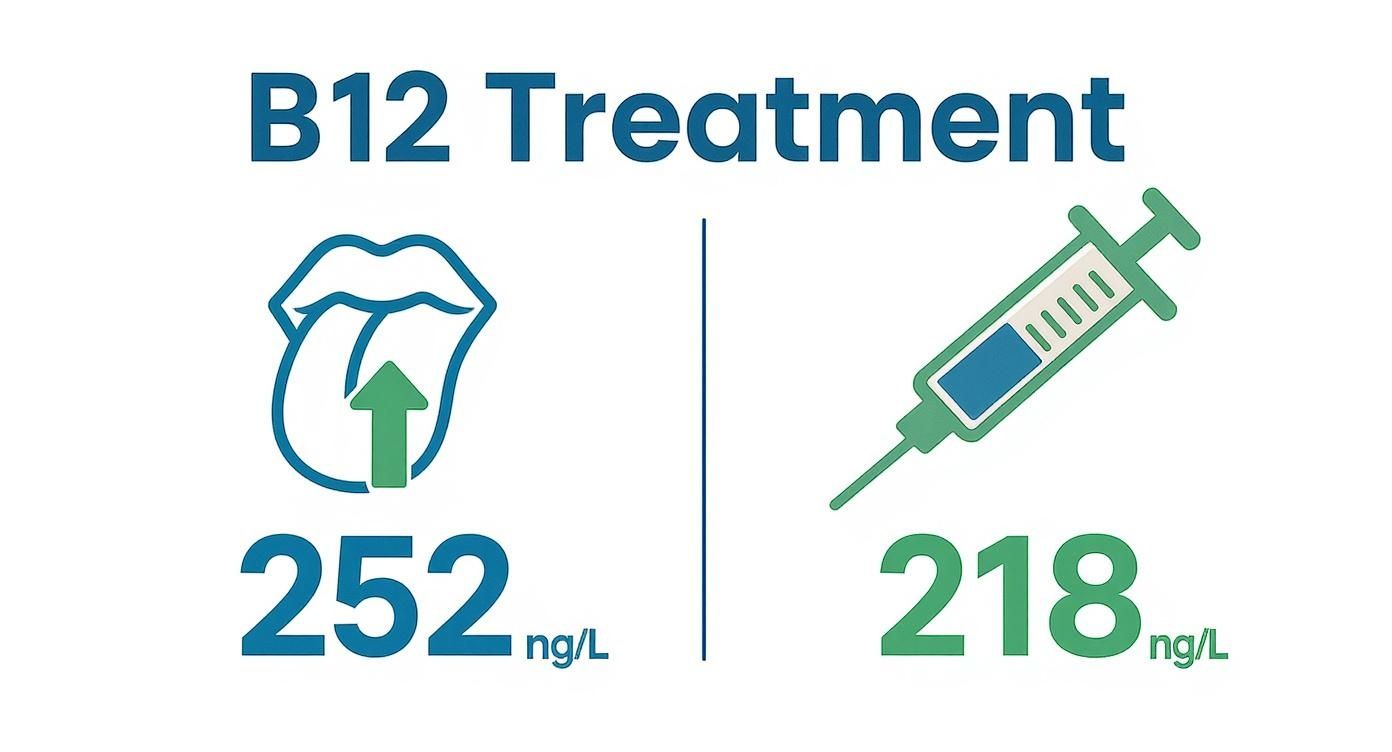
The data here makes it clear: for those without serious malabsorption problems, a well-formulated oral supplement can be a surprisingly powerful and effective choice.
When Oral or Sublingual B12 Is Your Best Bet
For the vast majority of people with a mild to moderate deficiency, a high-dose oral or sublingual supplement is an excellent, evidence-based path forward. They're non-invasive, more affordable, and incredibly effective when used correctly.
Oral B12 is often the perfect solution if you:
- Follow a Plant-Based Diet: Vegans and vegetarians often face dietary gaps, not absorption problems. Oral supplements are tailor-made for this.
- Are an Older Adult: Aging can lower stomach acid and hinder B12 absorption, but modern high-dose oral options are designed to overcome this common hurdle.
- Have a Mild Deficiency: If your levels are a bit low but you aren't experiencing severe symptoms, a daily supplement is usually all you need to get back on track.
- Prefer a Non-Invasive Approach: If you have a fear of needles, sublingual or oral B12 offers a completely pain-free and stress-free alternative.
- Need Long-Term Maintenance: Many people use injections to correct a serious deficiency, then switch to oral supplements to easily maintain healthy levels for the long haul.
Key Takeaway: The whole b12 injections vs oral debate often misses the point. It’s not about which method is stronger, but which one is smarter for your body. For a lot of people, a high-quality sublingual B12 supplement is both the smarter and more effective choice.
Ultimately, practical factors like cost and convenience also play a big role. Oral supplements are almost always more affordable and don't require a prescription. Just remember that consistency is everything, so choosing the method that fits most seamlessly into your daily routine is critical for success. To get the most out of any supplement, knowing the best time to take vitamins can make a real difference in your results.
Frequently Asked Questions About B12 Supplementation
When you're looking into B12, a lot of practical questions come up. Whether you're weighing the pros and cons of injections versus tablets, getting clear answers helps you figure out the best path forward. Here’s what people most often ask about the B12 injections vs oral discussion.
How Long Does It Take to Feel a Difference?
Whether you start with injections or a high-dose oral supplement, many people say they feel a real improvement in their energy and mental clarity within just a few days to a week. That initial response can be pretty quick as your body finally gets the nutrient it’s been missing.
But completely fixing a deficiency is more of a marathon than a sprint. It can take several weeks or even a couple of months of consistent treatment to fully replenish your body's B12 stores and ease all the symptoms, especially neurological ones like tingling or brain fog. Your doctor will almost certainly want to track your progress with blood tests to see how you're responding and adjust your plan as needed.
Think of it in two phases: an initial "loading" phase with more frequent doses to get your levels up, followed by a long-term maintenance schedule. The key, no matter which method you use, is consistency.
Are B12 Injections or Supplements Safe?
The good news is that both forms of B12 are considered very safe. Vitamin B12 is water-soluble, which means your body just gets rid of any excess through your urine. This makes it incredibly hard to overdose.
That said, each method has its own minor things to be aware of:
- B12 Injections: The most common issue is a little bit of discomfort right at the injection site. You might have some temporary pain, redness, or swelling, but it usually fades within a few hours.
- Oral B12 Supplements: High-dose oral B12 is known for being extremely well-tolerated. In very rare cases, some people might experience mild digestive issues like diarrhea or a feeling of itchiness.
It’s always a good idea to chat with your healthcare provider before starting any new supplement. They can make sure it’s the right move for your specific health situation and check for any potential interactions with other medications you’re on.
Can I Switch from Injections to Oral Supplements?
Absolutely. Moving from B12 injections to oral supplements is a very common strategy, especially once you're in the long-term maintenance phase. This switch usually happens after an initial round of injections has successfully corrected a serious deficiency and your B12 levels are stable.
The trick is to make the transition under your doctor's guidance. They'll recommend the right high dose for an oral or sublingual supplement—usually somewhere in the 1000-2000 mcg daily range—to keep your levels steady. Follow-up blood tests are non-negotiable here; they’re the only way to be sure the oral therapy is actually working for your body's unique absorption ability. This way, you can switch smoothly without losing all the progress you've made.
At Elite Bioscience, we provide access to high-quality, third-party lab-tested vitamin therapies to help you optimize your health from the comfort of your home. Explore our tailored wellness solutions and take control of your vitality today. https://elitebioscience.co
QUICK SEARCH
Make an account today to start your journey towards a better and healthier lifestyle.
